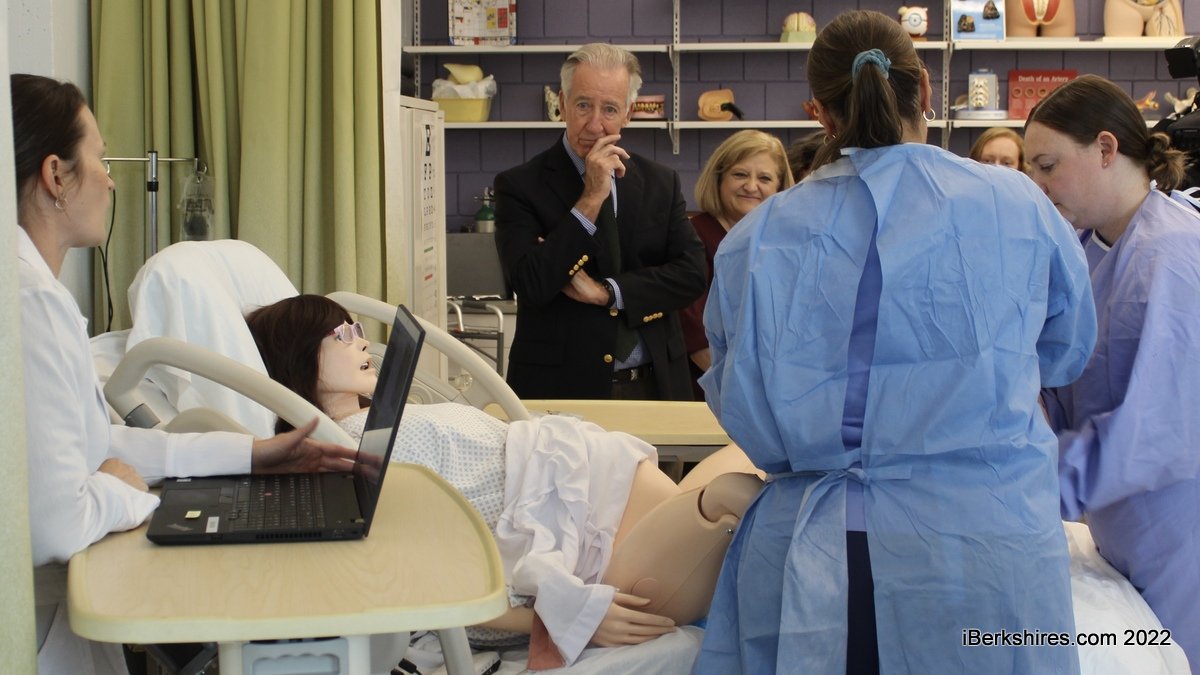Congressman Neal Touts $350k Grant for BCC Nursing Equipment

PITTSFIELD, Mass. — U.S. Rep. Richard Neal traveled to Berkshire Community College on Wednesday to tout a $350,000 earmark he placed for upgrades to the college's nursing program simulation (SIM) equipment.
The congressman later traveled to Adams to announce a $1 million grant for the Greylock Glen.
Neal credited part of Berkshire Medical Center's high-quality care to its link with BCC, which provides hands-on experience to medical professionals in training.
"This announcement today, I think is consistent with what we've had a chance to witness," he said. "And that's been the success of Berkshire Community College."
Earlier in the year, Neal secured the $350,000 grant through Congressionally Directed Spending (CDS) from the U.S. Departments of Labor, Health and Human Services, and Education.
It is one of 10 CDS projects submitted by the congressman that total more than $9 million throughout the First Congressional District of Massachusetts.
The labs simulate health-care settings to offer training and clinical experience. BCC's equipment has not received much in the way of upgrades since 2009.
"This grant will be used to upgrade the equipment and to give our students a hands-on approach to give safe care and a non-threatening environment, to make mistakes to be redirected where they make mistakes, and to really actively learn outside of the clinical setting," Dean of Nursing Lori Moon said.
"So really, simulation is that bridge between theory and clinical practice, in a very safe environment and a non-threatening environment."
The funds will go toward two new maternity mom and newborn models, two more 5-year-old models, wound-care kits with accompanying software, an electronic medical record program, an Omnicell medication dispenser, and crash carts.
The models will have upgraded technology from current ones to provide the students with a more realistic experience.
"The faculty and nursing students are so excited to add this equipment to be able to continue to grow our program to educate more and more nurses each year," Moon said.
"That's really our goal here, to meet the needs of our community. We know with the nursing shortage that's a real need and BCC is really trying very hard to meet that need for our community."
Elizabeth Kirby, director of education at Berkshire Health Systems, spoke on the importance of simulation.
She said it is a vital part of education for beginning students through versed physicians and is an interactive learning method that takes students out of a stressful environment and allows them to learn.
"We're seeing across the state [and] country a decrease in medical errors because of the use of simulation because they can really hone in and practice clinical skills until they have an excellent level of proficiency," Kirby explained.
"Medical simulation is used at both graduate and undergraduate levels and finally, there's a reduced risk to patients because of simulation because we're safer as we practice before we go in. In my day, we practiced standard patients so it's so much better now."
She added that BCC has been a strong leader in the community for beginning simulation experiences and Berkshire Health Systems is pleased to have a strong working relationship with it.
One of the ways that BHS is addressing its staffing shortage is through a Talent Pipeline program which offers paid training opportunities that lead directly to a career in health care. This brings more students through the BCC nursing program.
The nursing students demonstrated two medical scenarios with their current SIM models: a mother giving birth and a child struggling to breathe while having an asthma attack.
Neal also spoke of the importance of Medicare — saying that it is the reason parents aren't living in their children's attic — and loan forgiveness.
He agreed with President Joe Biden's recent stance on making loan forgiveness easier for those in public service.
"I think that that's a great middle ground, giving some relief on student loans for people who take public service. I think that's really a big deal. I was for whatever the president wanted to do largely because I thought it should be directed to those who need it. I am not a champion of loan forgiveness for the Rockefellers. I think that they can handle it," he said.
"But I think at the same time that for people that are coming out of a community college system or you want to go to UMass or to Westfield University or they want to go to MCLA, Williams, or places like that. I think that giving them some relief is a really good thing.
"The other part of it is that the challenge on student debt, it's also, you can juxtapose what I said a moment ago about parents living in your attic, well, it also is a good idea to keep students from having to live in their parent's cellar."
Tags: BCC, Neal, nursing education, state grant,


















